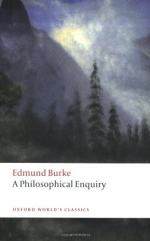
|
| Name: _________________________ | Period: ___________________ |
This quiz consists of 5 multiple choice and 5 short answer questions through Part IV, Sections I - VII.
Multiple Choice Questions
1. How, according to Burke, can light and dark be equal?
(a) Because according to science, there is no difference between light and dark.
(b) When the overpowering nature of one creates the effect of the other.
(c) Only when quantities balance each other.
(d) If one experiences light and dark for equal periods of time.
2. What is Burke's argument about the relation of danger to the sublime?
(a) Danger is never a part of any sublime object.
(b) Danger and terror are the same thing and are equal portions of the sublime.
(c) Danger does not physically need to be present or real for an object to be sublime.
(d) Danger is absolutely necessary to the sublime and must be present.
3. According to Burke, why is procreation pleasurable?
(a) Because the rest of life is terrible, and there must be at least one pleasurable thing in life.
(b) Because without some form of pleasure, society would devolve into warfare.
(c) To connect humans and animals in the realm of the senses.
(d) To incite people to engage in it, since it is necessary to survival.
4. What literary example does Burke give as representative of magnificence?
(a) A folk ballad from Scotland.
(b) One of Donne's Holy Sonnets.
(c) A passage from Shakespeare's _Henry IV_.
(d) An excerpt from Milton's _Paradise Lost_.
5. What is the state between pleasure and pain, according to Burke?
(a) Confusion.
(b) Anger.
(c) Joy.
(d) Indifference.
Short Answer Questions
1. How do smells and tastes become sublime most effectively?
2. What is the effect of opiates or liquors, according to Burke?
3. What are sources of the "sublime?"
4. Why is grief a part of pleasure, according to Burke?
5. When might the sublime be delightful?
|
This section contains 410 words (approx. 2 pages at 300 words per page) |

|




